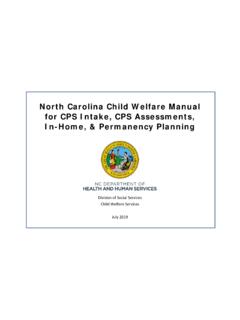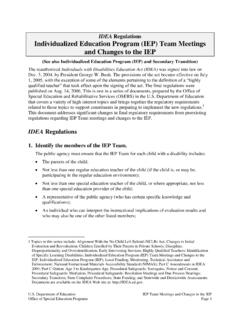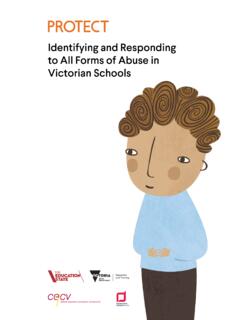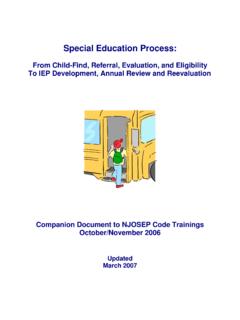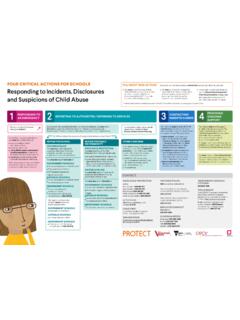Transcription of The context, roles and tasks of the child and family ...
1 The context, roles and tasks of the child and family social worker Produced by the BASW England Children and Families Group child and family social work is often in the media spotlight. This is as it should be since social workers are at the forefront of providing help, support, robust quality assessments and public protection to children and their families who are struggling with a wide range of difficulties. However, most members of the public, including many who need and can benefit from the help available and some media commentators and politicians, have very limited knowledge about what child and family social workers actually do. Many are employed in local authorities to assist, support and promote the welfare and rights of children and their families in often difficult and stressful situations and when necessary have to safeguard children, including taking children into care.
2 This is only one possible setting and aspect of their work. In recognition of this, the Children and Families Group (C&F Group) of BASW England has prepared this briefing on the roles and tasks of child and family social workers. In doing so they had in mind not only politicians, journalists and media representatives who contact BASW for briefings, usually when a particularly troubling event has occurred (and through them, members of the public) but also those contemplating a career in social work, or those in the early stages of their training considering which social work path to follow. 1. The context for child and family social work in England Which children, their families, their carers and wider communities may need and have a legal right to a child and family social work service?
3 Children, young people and their families have rights to receive generally available services such as education, health, community, social security or housing services based on either age or legally specified need. At times of stress, vulnerability or exposure to danger, some children, their parents or others who care for them may also need and have a right to, a range of social work and other specialist services (in line with the United Nations Convention on the Rights of the child and the England and Wales Children Act 1989). These are strengthened by statutory guidance including Working Together to Safeguard Children and regulations and guidance on children looked after by a local authority, including care planning guidance. For further information contact: Gavin Moorghen BASW England Professional Officer Email: Services may be provided in an emergency, for a short time to help them through a stressful period in their lives, or for a longer period and will be based on an assessment of family needs and any risks to the short and longer term wellbeing of the children, alongside the strengths and existing resources of parents and children.
4 Local authorities in collaboration with colleagues in health, welfare and justice agencies publish guidance on the thresholds used locally to determine whether an in need service will be provided, as appropriate, to a particular child and members of their family . However this decision on whether a child is assessed as in need and services provided to a particular child and other family members is set out by Section 17 of the Children Act crucial social work decision conveys rights to a service, and involves the exercise of professional judgement for which social workers and their managers can be held accountable in the courts. family members may request a social work service. More often, with their permission, they will be referred by someone they know, usually a professional such as a health visitor, GP, teacher, youth worker of community police officer.
5 Anyone who considers that a child is being harmed or is at risk of suffering harm (usually a professional such as a police officer, doctor, teacher or health visitor) may refer the child for assessment of whether a formal child protection service is necessary. Exceptionally, this can be done without seeking the parents' or older child 's agreement, though usually professionals try to explain why they consider that this is necessary and the steps a social worker might take. Children receiving social work services can be aged from 0 (or even pre-birth) to 18. For some young people who have been in local authority care, a social work or social worker-led service may continue up to the age of 25. The reasons why a child and family social work service may be necessary are very varied but usually the parents and/ or children or whole family will be experiencing a combination of practical, emotional and relationship difficulties.
6 Children and parents in all income groups and with a wide range of disabilities, emotional and relationship difficulties may be assessed as in need of a social work service. However, a large (and growing) majority of the children and families referred for an additional family support or protective service live in circumstances of material poverty and disadvantage. 2. The employment and work settings for the child and family social worker child and family social workers work from a range of settings/ bases. The majority of child and family social workers are employed in a social worker-led child and family social work team which may be: locality/community based (geographical) or community of interest ( children with disabilities, including specialised teams for specific disabilities).
7 Functional teams child protection; out-of-hours duty; looked after children, leaving care teams; adoption and fostering teams Some work in multi-disciplinary/ or inter-agency community-based resource centres Sure Start or family Centres, Youth Offending Teams, health service child development or child and adolescent mental health team They may be seconded to or directly employed by other community resources: schools, hospitals, GP practices, the courts and justice settings ( Cafcass, probation) They may work in residential settings such as children s homes, facilities for children with 3 mental health conditions, residential family centres, or custodial establishments. 3. Who provides and who funds child and family social work services? The largest numbers of child and family social workers are directly employed in the social care divisions of local authority Children s Services Departments, though some of these may be seconded or out-posted to work in schools, health service provision or may be more loosely attached to these community facilities.
8 Some child and family social workers are employed by other parts of local government ( in troubled families section of district council housing or in community safety departments) They may be directly employed by third sector agencies (voluntary or private for profit) contracted by local authorities to provide are services that the local authority is mandated to provide (often direct care services such as foster or residential care). Some child and family assessment services are commissioned by local authorities or the courts from independent social workers (self-employed or working in groups). Following the implementation of Section 1 of the Children Act 2008, some local authorities have commissioned voluntary sector agencies, social enterprises or companies to undertake specific functions on their behalf (as with social work practices providing children in care and leaving care services, or voluntary adoption agencies, or Trusts set up specifically to provide parts or all of the local authority mandated functions.)
9 Increasingly other statutory agencies academy schools, or health service trusts are directly employing child and family social workers However, irrespective of the setting, the major part of the funding of child and family social work is provided by local government or national government departments (as with the Cafcass service provided by the Ministry of Justice, the DCLG Troubled Families programme, or DfE specific grants to the voluntary or statutory sectors) usually awarded on a competitive basis. BUT charitable giving by individuals or trust makes an important supplementary contribution to the child and family social work service provided by the voluntary sector and facilitates innovative work which may not otherwise be possible. 4. The professional and community networks of child and family social workers For much of their work, child and family social workers work in teams around the family or teams around a specific child or sibling group.
10 Because of the broad scope of their role, and often because their agency holds lead accountability for the quality of the service, child and family social workers often take the lead role in coordinating the work of these teams, as well as in chairing professions meetings and team around the family or core group meetings with family members. Experienced child and family social workers usually coordinate, and chair child protection conferences and children looked after review meetings, for which their knowledge of group dynamics and groupwork skills are essential. Knowing about, and developing skills for working in inter-agency and inter-professional settings is an essential component of social work qualifying and post-qualifying training. 4 5. The roles and tasks of child and family social workers The actual roles and tasks undertaken by a child and family social worker will vary in breadth and depth depending on the setting in which he or she works, but will require them, at any one time, or at different times in their careers (as spelled out in the BASW Professional Capabilities Framework) as beginning or advanced practitioners, team leaders, senior managers to: Use their knowledge and skills to work ethically, collaboratively and creatively with community members, policy makers and service providers to support community capacity, personal and family resilience, earlier intervention and active citizenship.










